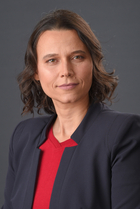Olivera Koprivica
olivera.koprivica@uni-erfurt.deDoktorandin (Max Weber Centre for Advanced Cultural and Social Studies)
Office hours
nach Vereinbarung
Visiting address
Max-Weber-Kolleg für kultur- und sozialwissenschaftliche Studien
Campus
Nordhäuser Str. 63
99089 Erfurt
Mailing address
Universität Erfurt
Max-Weber-Kolleg für kultur- und sozialwissenschaftliche Studien
Postfach 90 02 21
99105 Erfurt

Personal Information
Curriculum Vitae
- June 2008. - Magister degree in Liturgical Studies, Faculty of Theology, University of Leipzig (Magister thesis: Gottesdienstliches Gebet bei Georg Rietschel)
- April 2004. - Graduated theologian, Faculty of Orthodox Theology, University of Belgrade (Diploma thesis: The Problem of the epiclesis in the Roman Mass)
Research Topics
- Monasticism
- The body and religious belief
- Worship and gender practices
- Religious symbolism and iconography
Research Project
Female Bodies and Angelic Likeness: The Place and Role of the Body in Everyday Life of Orthodox Women Monasticisms – A Qualitative Study
The project focuses on the subject matter of orthodox monastic tradition, monastic culture and its anthropological, theological and spiritual particularities. It approaches the issue of the practice of contemporary female monasticism by involving the theme of corporeality and by considering the body as a resumptive point of monastery life and monastic spirituality. Consequently, research attempts to answer the questions such as: how everyday monastic practice, specified through the worship, spiritual authorities, canonical tradition and informal rules, constitutes self-processes and forms self-perception; how body learns, feels, responds and experiences religious practices; how nuns actions transform space and time altering the symbolic structuring of their world; how nuns actions function as world-making activities; which bodily practices are being used to verify and represent certain monastic virtue; what is the importance of social structure in which the self-world and self-God relationships are individuated and lived.

